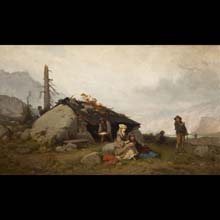
material: oil on board
dimensions: 45 × 74 cm
description: In the 1870s, Aleksander Kotsis was associated with the Munich circle. He arrived in the capital of Bavaria in 1871 and spent there a few years with several breaks. In terms of the subject and composition, A Trip to the Tatra Mountains serves as an example of referring to mountain landscapes, which were popular in Munich, known as Almenlandschaften. Moreover, the painting is also marked by a palette restricted to one dominant tone, distinctive of Polish Munich painters. Although produced during the artist’s stay in Munich, the work is regarded as a view of the Tatra mountains. It shows a mountain pass with a shepherd’s shelter. A group of tourists from the city are taking a rest in front of it. The subject matter of the painting reflects a fashionable way of spending free time in 19th-century Europe. Trips to the mountains were no longer reserved only for the gentry and aristocracy, but became a popular leisure activity among townspeople, a semblance of contact with nature. Aleksandra Krypczyk
exposition: The Gallery of 19th Century Polish Art in Sukiennice,
The Cloth Hall, 1, Main Market Square
key: Realism, polish impressionism, beginnings of symbolism >>>
dimensions: 45 × 74 cm
description: In the 1870s, Aleksander Kotsis was associated with the Munich circle. He arrived in the capital of Bavaria in 1871 and spent there a few years with several breaks. In terms of the subject and composition, A Trip to the Tatra Mountains serves as an example of referring to mountain landscapes, which were popular in Munich, known as Almenlandschaften. Moreover, the painting is also marked by a palette restricted to one dominant tone, distinctive of Polish Munich painters. Although produced during the artist’s stay in Munich, the work is regarded as a view of the Tatra mountains. It shows a mountain pass with a shepherd’s shelter. A group of tourists from the city are taking a rest in front of it. The subject matter of the painting reflects a fashionable way of spending free time in 19th-century Europe. Trips to the mountains were no longer reserved only for the gentry and aristocracy, but became a popular leisure activity among townspeople, a semblance of contact with nature. Aleksandra Krypczyk
exposition: The Gallery of 19th Century Polish Art in Sukiennice,
The Cloth Hall, 1, Main Market Square
key: Realism, polish impressionism, beginnings of symbolism >>>












